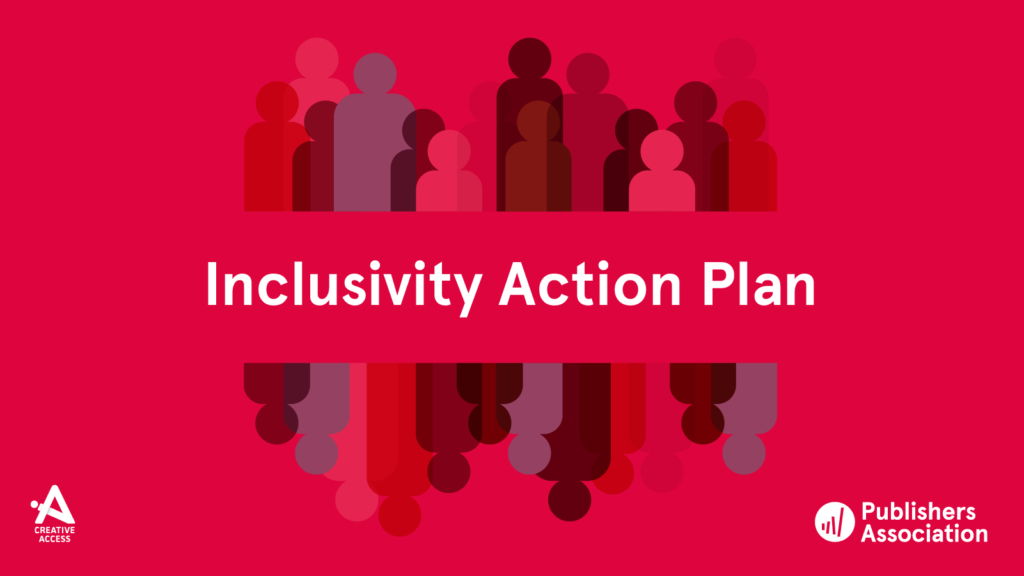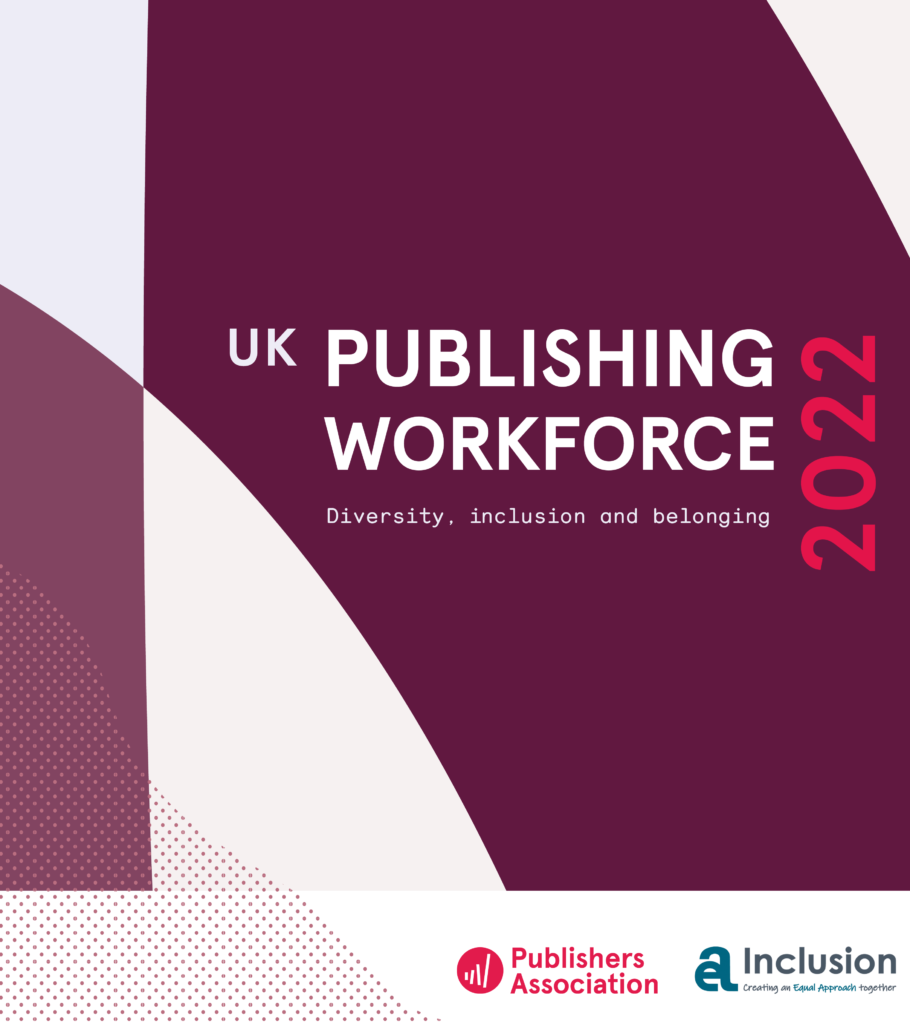Diversity and Inclusion
We work alongside publishers and industry partners to improve diversity and inclusion in the industry.
Collectively, the publishing industry recognises that it needs to do more to address this issue and there are a growing number of targeted initiatives.
We hope that through industry-led action we can create a workforce that represents the rich diversity of the UK’s population, opening up opportunities for aspiring publishers and ensuring the long-term health of our industry.
We work closely with members and a number of partners such as the Creative Industries Council on this agenda.

Inclusivity Action Plan
The Publishers Association Inclusivity Action Plan, developed with Creative Access, comprises a set of 10 commitments for publishing businesses to undertake over the period 2023-2026.
- Develop and embed an inclusivity policy which is set and driven by senior leadership. This should state your organisation’s commitment to ensuring an equitable, diverse and inclusive workplace. The policy should include the process for making complaints of discrimination in the workplace; how the company will monitor and assess the effectiveness of the policy; and working best practices including the support and reasonable adjustments available for all individuals. You can download a template policy here.
- Develop a governance model (which might include nominating an inclusivity champion that reports to your board or management committee) to ensure your organisation is held to account on policy implementation and meeting targets. Investigate opportunities for staff feedback which is fed into senior leadership, such as employee networks or anonymous surveys, ensuring visibility on how this feedback is used.
- Commit to data collection and support consistent cross-industry data collection. This will help measure both the demographics of the publishing workforce (to ensure we are building diverse and representative teams) and the culture within the sector (to help ensure equity in experience, progression and retention).
- Commit to distributing and completing the Publishers Association’s independent industry-wide workforce survey once every two years which will be launched during 2023. This does not preclude you undertaking your own regular internal workforce survey. This will allow us to measure intersectionality across the industry.
- Consider representation beyond your direct employees and think about supply chain data collection including your researchers, authors, peer reviewers, editors, external suppliers and freelance staff. You can use the Publishers Association’s author data collection toolkit.
- Ensure your output is accessible, authentic and inclusive including content, design, imagery and language. Try to widen the pool of contributors to bring in new voices to the sector, aim for speaker panels at events and festivals to represent all audiences. Ensure efforts are made to reduce bias in content across all channels and that you are compliant with relevant legislation around accessibility of content and employer duties as outlined in the Equality Act 2010.
- Ensure all staff participate in inclusivity training or have opportunities to learn about diversity, equity and inclusion concepts. This may focus on inclusive recruitment (for those responsible for hiring), allyship training, disability equity and mental health and well-being workshops. Training aims to affect behavioural change, identify any barriers to doing so, and help ensure inclusive structures and practices are consistently implemented across the industry.
- Provide opportunities for flexible, hybrid, agile and part-time working to allow more easily those who live outside cities to be able to work in the industry and to be considerate of those with different working needs and requirements.
- Create clear career progression pathways so that staff understand what they need to do to move roles or reach the next level and that promotions are equitable. This will help support industry progression and retention and ensure a talent pipeline from marginalised backgrounds into senior management.
- Provide opportunities for mentoring to support new and existing staff from under-represented groups, either internally or via external organisations. Consider implementing a formal sponsorship programme to accelerate career development, strengthen talent and improve engagement of staff that are under-represented in the sector, or who are at transitional career stages.
- Create opportunities for hiring from under-represented groups; consider hiring a Publishing Assistant apprentice or via a third party (such as Creative Access, Change100 or 10,000 Black Interns). This will provide opportunities for those who might not otherwise be able to access careers in the sector. Ensure any roles are advertised as widely as possible and, when possible, using specialist organisations to do so.
- Work towards pay equity, including salary transparency. Aim to Include a figure or salary range on job adverts to encourage candidates to apply both through your organisation and via third-party recruiters. Try to benchmark salaries and learn more about the case for salary transparency here. Provide expenses to all work experience candidates and pay interns or work experience candidates who are with you for one week or longer. Work towards parity of pay and address any issues highlighted in relevant pay gap surveys.
As well as committing to the plan, we also ask publishers to aim for their UK workforce to reflect national demographics at all levels, across the following characteristics:
- Race and ethnicity
- Socioeconomic background
- Disability
- Gender
- Sexual orientation
These targets will be measured at an industry level and reported bi-annually between 2023 and 2026.
The full Inclusivity Action Plan can be read here.
We encourage publishers and other industry stakeholders to support the initiative by signing here.
Inclusivity Action Plan signatories
UK Publishing Industry Diversity & Inclusion Survey
Since 2017, we have undertaken an industry-wide survey of the workforce demographics of UK publishing companies to obtain a true reflection of diversity within the industry. Participation in this survey has grown significantly in the time we have been conducting it and the results help to direct and target our activity.
The results of the initial survey were released in 2017, which can be found here.
A more expansive report for 2018 came out at the start of 2019, which you can read here.
The most comprehensive overview of the UK publishing workforce ever recorded was released at the beginning of 2020, which can be read here.
The results of the 2021 survey can be found here.
The results of the most recent 2022 survey can be found here. This will be the final iteration of our UK Publishing Workforce report in its current form. On 31st January 2023, the Publishers Association launched the ‘Inclusivity Action Plan’ that comprises of a set of 10 commitments for publishing businesses to undertake over the period 2023 – 2026. This will include a new way of collecting data, in the form of a survey every two years, that will ultimately provide a clearer, more comprehensive view of our industry.
